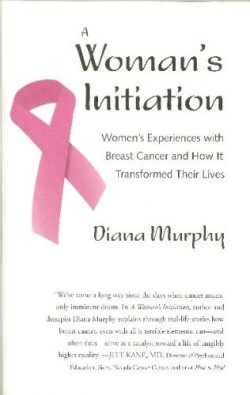A Woman's Initiation
Women's Experiences with Breast Cancer and How It Transformed Their Lives
There’s no denying that women fear breast cancer more than any other illness. This book calms that fear by demonstrating the profound changes that occur in women who experience the disease.
The author combines her narration of the stories of fifteen women with their own words. She writes: “Breast cancer is a female-specific mid-life initiation. It threatens all that traditionally defines a woman: fertility and motherhood, the vixen sexuality and maidenly beauty of youth.”
Murphy wrote the book after supporting her best friend through recurring breast cancer that ended in death. With a master’s degree in clinical psychology from Antioch University, she is a licensed psychotherapist in San Francisco, focusing on women with cancer. She encourages her clients to “use a breast cancer diagnosis as a springboard for finding a greater sense of self, and creating a more authentic, satisfying life.”
Billie Sue turns people’s heads when she enters a room, and she likes that attention. At age thirty-nine, her first mammogram revealed breast cancer that required a mastectomy and chemotherapy. Once recovered, she decided to help other women in her rural county by starting a foundation to support those with the disease: “The first cause we championed was the Wellness Center, which had lost funding and was in jeopardy of closing.”
Gina was only thirty-two when a tumor was discovered following breast reduction surgery. During treatment she found solace in a support group. She says, “There’s so much shame and secrecy about cancer, especially among black women. More white women are diagnosed with breast cancer, but black women die of it.” Once healthy again, she helped support other women at a cancer recovery center. Ten years later a new cancer developed that had spread to her lymph nodes. Gina says, “I wish I could say that I felt like I was done with cancer. I’m expecting a third round.” Meanwhile she lives her life to the fullest and continues supporting others.
Murphy devotes her last chapter to women who died, including Joy, who had a lump appear in her remaining breast five years after a mastectomy. Told by her doctor it was probably a cyst, she waited a crucial six months before another exam. By then the cancer had invaded her lymph nodes. Joy declined further treatment that promised no cure. In her last days, she made amends with people and called friends, saying, “I’m dying. Please come to my farewell party.” The celebration of Joy’s life lasted three days and lifted everyone’s spirits.
Although some might prefer to avoid this solemn subject, Murphy’s psychological expertise reassures readers that people with serious disease still have choices that are rich with rewards. The book offers inspiration for those diagnosed with breast cancer and is important for family members and friends as they endeavor to give meaningful support to their loved ones.
Disclosure: This article is not an endorsement, but a review. The publisher of this book provided free copies of the book to have their book reviewed by a professional reviewer. No fee was paid by the publisher for this review. Foreword Reviews only recommends books that we love. Foreword Magazine, Inc. is disclosing this in accordance with the Federal Trade Commission’s 16 CFR, Part 255.

